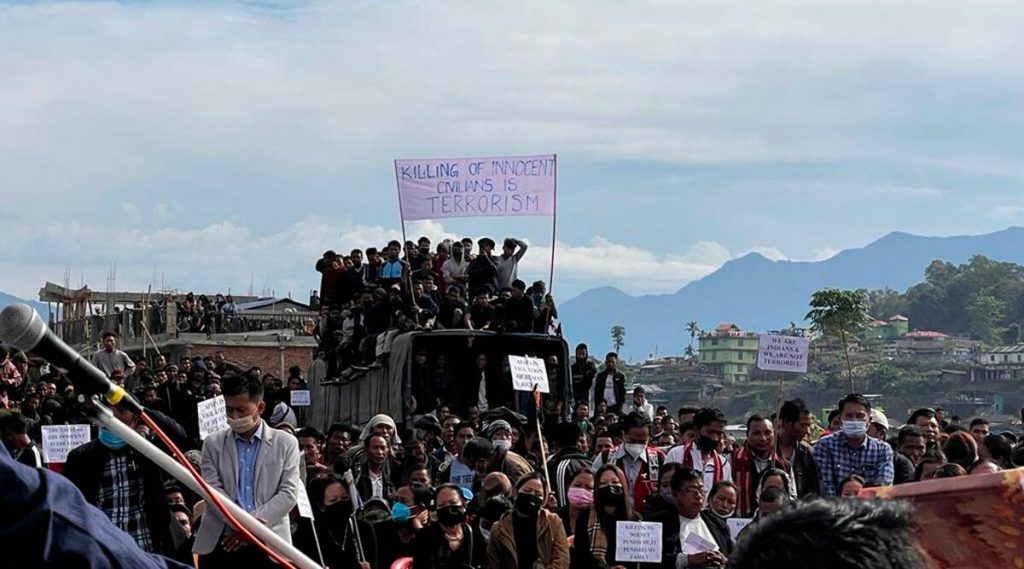The killings of 14 innocent people in Nagaland – six in the first and the rest in two other incidents in quick succession – by the armed forces 4 December have once again brought to the fore the pertinent question, whether there is any need for retaining in the statute book the colonial era, draconian Armed Forces (Special Powers) Act (AFSPA). Union Home Minister Amit Shah’s expression of regret for the mindless massacre or the announcement of a probe by a Special Investigation Team is unlikely to assuage the anger and anguish of the people of Nagaland. This is time to seriously ponder over the main issue and the cause of prolonged sufferings of the people of the northeast, who have, for years been subjected to frequent abuse of the AFSPA. The Chief Minister of Nagaland Neiphiu Rio and his counterpart in Meghalaya, Conrad Sangma, both BJP partners, have already raised the demand for repeal of the Act and they are joined by the Left parties which questioned in the Parliament the wisdom of retaining the Act.
The wanton killings by the security forces on the plea that they were looking for insurgents cannot be condoned by a simple expression of regret either by the Army or the Centre. The incident only exposes the folly of handing over to the Army wide powers in the form of the AFSPA which gives the security forces virtual immunity to whatever they like to do to civilians, rendering many other laws inoperative even when they go berserk. No wonder Rio urged the Centre to annul the law which he describes as a “black spot on the image of the country.”
The AFSPA gives armed forces special powers to control areas the government designates as ‘disturbed’ necessitating the use of the armed forces in aid of the civil authorities. The Act has wide-ranging powers authorising the armed forces to open fire, enter and search without warrant and arrest any person who supposedly committed a cognisable offence. For all these acts they enjoy immunity from being prosecuted. And there lies the rub.
Initially, it was the states which had the power to declare a territory ‘disturbed’. But, in 1972 it was transferred to the Centre. Currently, AFSPA is in force in Jammu and Kashmir, Nagaland, Assam, Manipur (excluding seven Assembly constituencies of Imphal) and parts of Arunachal Pradesh. Also, the law ceased to be in force in places where insurgencies had been curbed and the governments felt they could manage the situation with the help of the police. Hence, AFSPA was withdrawn in Tripura in 2015, while in 2018 the Centre also removed Meghalaya from the list. It is used in a limited manner in Arunachal Pradesh.
What makes the use of the Act suspect and objectionable is that it is based on the Armed Forces (Special Powers) Ordinance of 1942 issued during the Quit India movement. It is considered draconian as under AFSPA, the armed forces have the powers to shoot to kill or destroy a building on mere suspicion. A non-commissioned officer or anyone of equivalent rank and above may use force based on opinion and suspicion, to arrest without warrant, or to kill. He can fire at anyone carrying anything that may be used as a weapon, with only “such due warning as he may consider necessary.” This is why the mayhem was possible in Nagaland 4 December. The worst part of the Act is that no prosecution can be instituted except with the previous sanction of the central government. However much the Union Home Minister announces the formation of an SIT to go into the firing or the Army assures people of conducting its own investigation, these cannot inspire confidence in the affected people as both, it is obvious, would be partial.
The Jeevan Reddy Committee constituted in 2004 recommended a complete repeal of the law. “The Act is a symbol of hate, oppression and an instrument of high handedness,” it said. The Supreme Court in its judgement in 2016 observed the continuance of the Act in any region for extended periods signifies “failure of the civil administration and the armed forces.” The apex court also ruled the notion that the Act provides a free hand to security forces is flawed.
It is indeed a sad commentary on the Act that over 1,500 cases of alleged fake encounters were engineered in Manipur alone during the past 20 years. Irom Sharmila, known as the Iron lady of Manipur, has become a symbol of monumental protest against the abuse of the Act. She had been on hunger strike for 16 years demanding the annulment of the law. It is only natural that after the Nagaland incident showing blatant misuse of the powers of the AFSPA the clamour for its repeal would be made once again. The government will do well to find out a permanent solution to the problem rather than taking ad hoc measures. For, peace in Nagaland is hanging in the balance with the deal between the Centre and the NSCN (IM) being at a precarious stage and the anger of the civilians rising to a crescendo.
